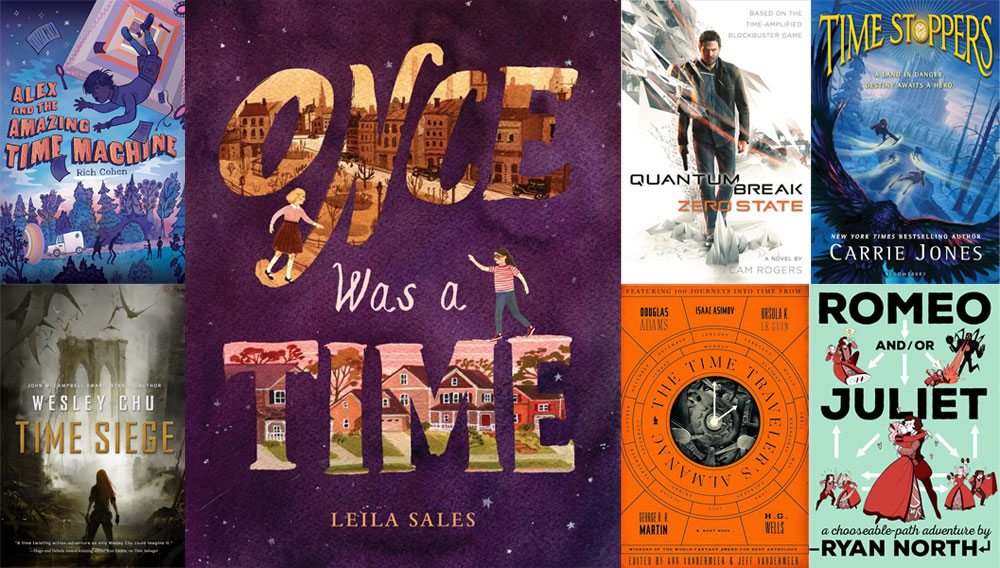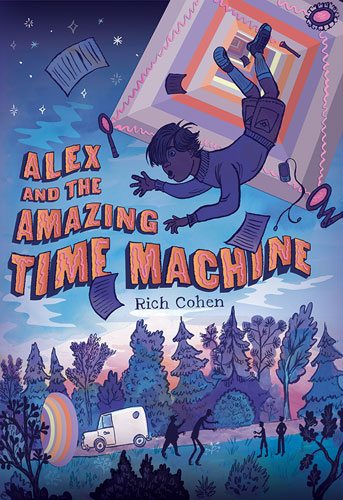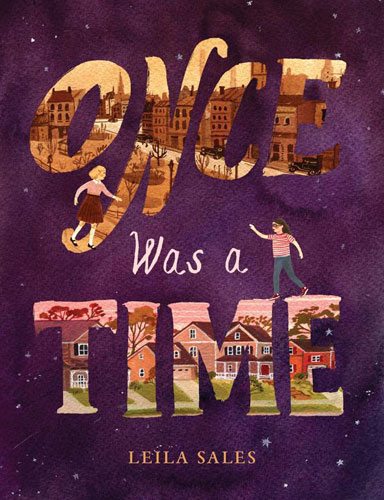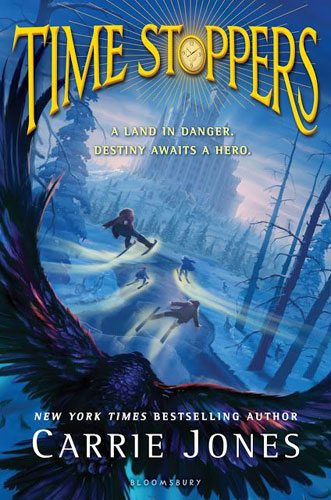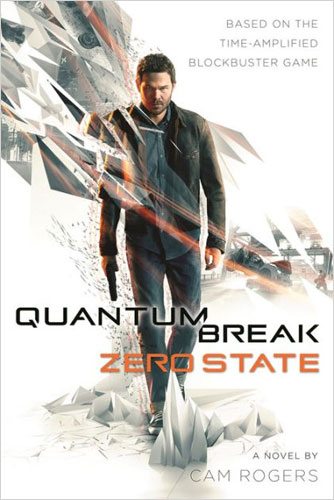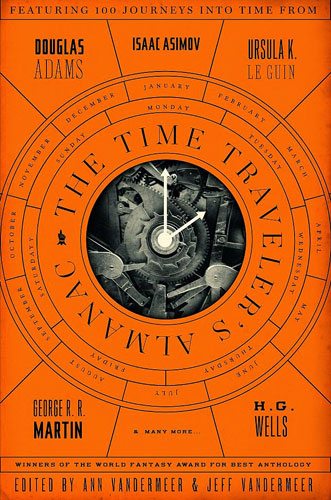Following up my Stack Overflow column about double lives, today’s column is all about time—time machines and time manipulation. And one that’s not exactly about time travel but uses a writing structure that lets the reader manipulate time.
Alex and the Amazing Time Machine by Rich Cohen
This book is for middle-grade readers. Alex Trumble is a pretty smart kid who happens to love the concept of time travel. Then two mysterious thugs show up, and they’re after the secret to time travel. When they kidnap his older brother and vanish, it’s up to Alex to invent a time machine and go back in time to piece together the clues and rescue his brother. This middle-grade book has lots of little hints dropped early in the book that only make sense later, and although the time machine explanation is rather silly (mirrors don’t work like that!), it’s still a fun read overall. One thing that bothered me, though, was that there were some inconsistencies in one scene that gets experienced twice (due to time travel)—some of the things don’t happen in the same order. I’m okay with hand-waving when it comes to how the time travel works, but you gotta keep your timelines straight.
Once Was a Time by Leila Sales
Lottie and Kitty are best friends—they like to pretend to be sisters (even though Lottie has an older sister)—living in England during World War II. Lottie’s dad is involved in some sort of research—well, turns out it’s time travel, and there are some sinister people after its secrets. Lottie manages to escape—into present-day Wisconsin. She’s totally lost in this unfamiliar world, and all she wants is to get back to her family and her best friend.
There’s no time machine in this book: the time travel is more like an accidental phenomenon, which is how Lottie gets stranded in time. And there’s not a lot of time travel, either—it’s more like a one-way ticket. Most of the book centers on Lottie in her new life—ending up in a foster home and basically starting a new life, becoming almost a new person, while still searching for the solution that will take her back home.
The book is written for middle-grade readers, though I think it would also be good for teens (and I really enjoyed it myself). The time travel almost serves as a metaphor for adolescence itself: Lottie falls in with a group of popular girls, and isn’t sure she still recognizes who she is. When they bully an unpopular boy, she doesn’t feel responsible because she doesn’t join in herself, and it’s not until later that she realizes how others perceive her. The pains of growing up, of navigating peer pressure and unfamiliar social customs, are woven into this story about traveling through time and solving a grand mystery—and the ending was not at all what I expected.
When I was looking through my stacks of books for other titles that would fit in a column about time travel, I came across this middle-grade novel: Time Stoppers. The cover even has a little clock in the “O” of “Stoppers,” so I figured, hey, this one must involve manipulating time in some fashion. (Aside: Man, if I had the ability to stop time, I’d be doing it all the time.) Well, as you might expect, there are some folks in this book who are known as “Time Stoppers” and, yes, they get that name from their ability to stop time. But—spoiler alert!—it only happens once during the entire book, over 200 pages into the story.
The story focuses on two kids: Annie Nobody and Jamie Alexander. Annie has been shuffled around foster homes for her entire life. Jamie lives with his father and grandmother, who have always treated him monstrously. But then both of them get thrown into a wild adventure that involves a magical hidden city under attack from evil beasts. There are some traditional fantasy elements—trolls, elves, dwarves, etc.—and some of them live among us (a bit like Muggles and magical folks in Harry Potter’s world). Annie is something of a Chosen One, destined to save the city; Jamie struggles with being the only non-magical person in the city and whether he actually belongs.
Time Stoppers had a fun story, but there were some things that bothered me (aside from the fact that there’s not much time-stopping involved): for one, the narration switches between Annie’s and Jamie’s perspectives without much of a transition. It’s third-person omniscient, but there was usually a focus, and that focus would move unexpectedly. The other part that bothered me was a particular magical Macguffin that gets mentioned very early on, and repeatedly, but it takes over 250 pages for the main characters to think, oh, right, we should go get that Macguffin. It seemed like much of the story could have been circumvented if the characters had just been paying attention.
This sequel to Time Salvager (adult sci-fi) is due out in July, but thanks to the magic of time travel, I’ve already read it. (Okay, not really: I got an advance reader copy.) Note: if you haven’t read Time Salvager yet (mentioned in this Stack Overflow column), this will include some spoilers from that book. In Time Siege, James Griffin-Mars is hiding among the Elfreth, a tribe originally living in the wastes of Boston. ChronoCom is still after him, propelled by the Valta Corporation, who wants desperately to retrieve Elise Kim, the biologist from the 21st century. The tribe flees to the Mist Isle—Manhattan, permanently covered in a weird EMP fog, trying to escape.
While this book does have some time travel in it, for the most part it’s set in James’ present, the 26th century. It’s about the battle between the tribes of the Mist Isle and the technologically superior Co-op forces that are after them. I do have to admit that there’s a little bit of the “Going Native” trope at play here: James, a former chronman who had nothing but contempt for the “savages,” eventually becomes part of the community and joins them as they fight against his former employers. However, Elise is really the one who fully joins the Elfreth, even becoming their leader, and she’s really a person who’s been pulled out of her own time. James’ relationship with the tribe is always on somewhat shaky footing.
The book also dives more into James’ alcoholism, which was already present in the first book. Spending most of your time interacting with people in the past who have long been dead can be really rough on you, and most chronmen are driven to drink or suicide. James’ struggle with his addiction really hits the breaking point in this book, and he’s finally forced to face the consequences.
It’s a fun sequel, and clearly lays the groundwork for the story to continue, so despite some of its flaws I’ll be interested in how this turns out.
Quantum Break: Zero State by Cam Rogers
Quantum Break is a video game released this past April that involves manipulating time: a time-machine experiment gives Jack Joyce the power to slow down time (thus moving very quickly, from the perspective of his enemies) and create “stutter shields” in which time freezes. Meanwhile, time itself is breaking down—sometimes time will stop altogether, or even rewind and replay in short segments, forcing Jack to work his way through explosions and a fractured world with unpredictable pacing. It looks pretty amazing.
So what does that have to do with books? Well, Quantum Break: Zero State is a novel based on the video game, written by one of the guys who was on the creative team for the game. However, it’s not a novelization of the story in the game: in a world with time travel and branching timelines, Cam Rogers chose an alternate timeline for his story, so the book doesn’t spoil the video game’s plot and vice versa, even though they share the same characters and world.
The book focuses on Jack Joyce, who left Riverport after a nasty incident and hasn’t been back in six years. When he comes back, he gets caught up in a complex web—a time machine, a powerful corporation, and the end of time itself. I don’t want to give too much away, but I had a blast reading this book. Aside from Jack’s time-manipulation powers, which are a reflection of the video game, there’s a mind-bending storyline that plays with time travel and causality in fascinating ways. Some of it reminded me of 12 Monkeys, the way that sometimes trying to change the past actually causes what has already happened.
Romeo and/or Juliet by Ryan North
Okay, so this one is not about time travel per se, but it’s the sort of book that lets the reader rewind time over and over again. In 2012, Ryan North created a “chooseable-path” version of Hamlet (which was wildly successful on Kickstarter). Now, he’s following up with another collaboration with Shakespeare: Romeo and/or Juliet. Once again, you get to decide what the characters do—and even which characters you want to play! The obvious choices are Romeo and Juliet, but there are even “unlockable” characters, if you can find them among the branching paths.
Every ending has an illustration, from the likes of Noelle Stevenson, Jon Klassen, and … well, honestly, there are over a hundred endings so I’m not going to list all of them here. You can see the whole list here. Don’t like the ending you got? Back up, choose a different path, and it’s a different story! The paths that Shakespeare chose are helpfully marked with little hearts, in case you want to read the traditional narrative. As with the original, there’s some bawdy humor (though now modernized), so some parental discretion is advised.
The Time Traveler’s Almanac edited by Ann & Jeff Vandermeer
Okay, this last one has been sitting on my shelf for a while and I’ve only just begun to read it. I mean, it’s a really big book and somewhat intimidating, but it’s all about time travel. The anthology includes stories from H. G. Wells, Pamela Sargent, Elizabeth Bear, and Adrian Tchaikovsky, spanning over a century. There are stories about unexpected consequences of time travel, various methods of time travel, paradoxes, and messages sent to the past or the future. When I finish this one, I’ll be sure to come back and tell you all about it … yesterday.
Disclosure: I received review copies of these books.
